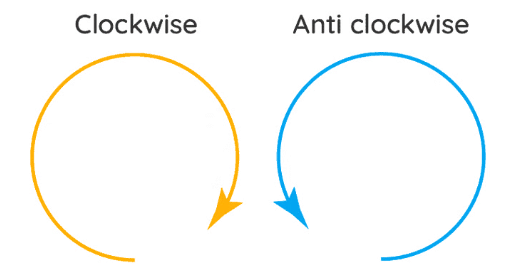Class 10 Exam > Class 10 Notes > Mathematics for GCSE/IGCSE > Rotations
Rotations | Mathematics for GCSE/IGCSE - Class 10 PDF Download
What is a rotation?
- Rotation entails the movement of an object around a specific point.
- The resulting rotated image maintains the same size and shape as the original object, but it assumes a new position and orientation.
How do I rotate a shape?
- Performing a Rotation: To execute a rotation on a coordinate grid, follow these steps:
- Using Tracing Paper: One effective method for drawing a rotation involves utilizing tracing paper, typically provided during exams upon request.
- Step 1: Tracing Paper Placement
Position the tracing paper over the page and trace the original object onto it. - Step 2: Center of Rotation
Place your pencil's point at the center of rotation. - Step 3: Rotating the Paper
Rotate the tracing paper by the specified angle, often a common angle like 90°, 180°, or 270° as per the question. - Step 4: Drawing the Rotated Image
With the tracing paper positioned correctly, carefully draw the rotated image onto the coordinate grid.
- Step 1: Tracing Paper Placement
How do I describe a rotation?
- You must be able to recognize and explain a rotation when shown one.
- To score well, your description of a transformation must be thorough.
- For a rotation, you need to:
- Identify it as a rotation.
- Specify the center of rotation (the point around which the object rotates).
- Indicate the angle of rotation (the number of degrees the object has turned around the center point).
- Describe the direction of rotation (clockwise or counterclockwise, except when the angle is 180 degrees, in which case direction is not necessary).

Question for RotationsTry yourself: What is a rotation?View Solution
The document Rotations | Mathematics for GCSE/IGCSE - Class 10 is a part of the Class 10 Course Mathematics for GCSE/IGCSE.
All you need of Class 10 at this link: Class 10
|
66 videos|674 docs|19 tests
|
FAQs on Rotations - Mathematics for GCSE/IGCSE - Class 10
| 1. What is a rotation in mathematics? |  |
Ans. In mathematics, a rotation is a transformation that turns a figure around a fixed point called the center of rotation.
| 2. How is a rotation different from a translation or reflection? |  |
Ans. A rotation involves turning a figure around a fixed point, while a translation involves moving a figure without changing its shape or size, and a reflection involves flipping a figure over a line.
| 3. What are some common examples of rotations in real life? |  |
Ans. Some common examples of rotations in real life include the rotation of the Earth on its axis, the rotation of wheels on a moving vehicle, and the rotation of hands on a clock.
| 4. How can rotations be described mathematically? |  |
Ans. Rotations can be described mathematically using angles and coordinates. The angle of rotation determines how much a figure is turned, and the coordinates of the center of rotation determine the fixed point around which the figure is rotated.
| 5. How can rotations be applied in geometry and trigonometry? |  |
Ans. Rotations are commonly used in geometry to transform and analyze shapes, and in trigonometry to study the relationships between angles and sides of triangles. They are fundamental concepts in both fields that help in solving various problems and proving theorems.
Related Searches















